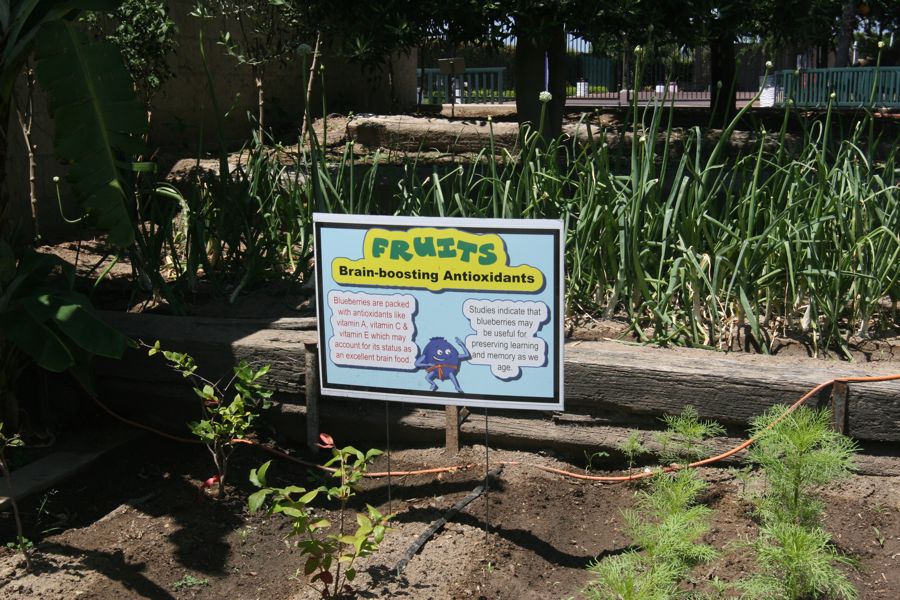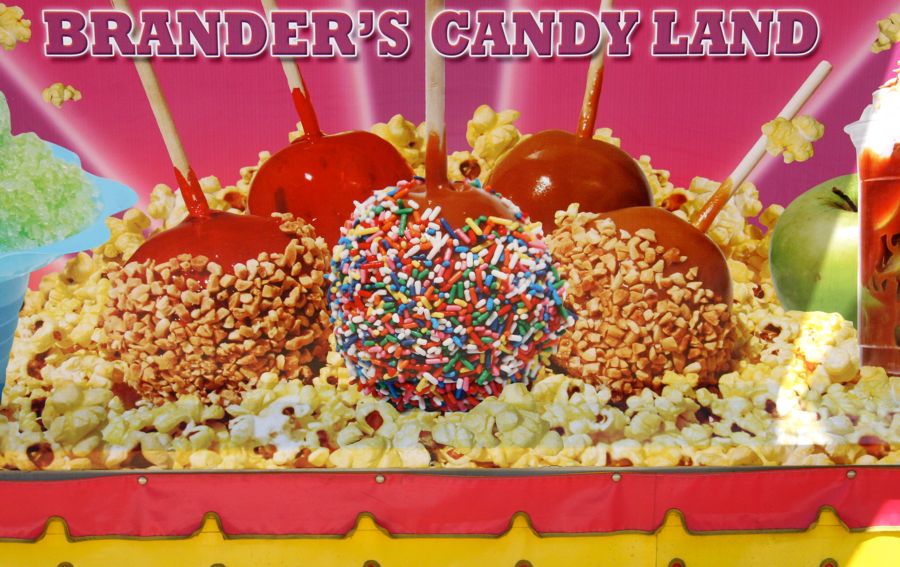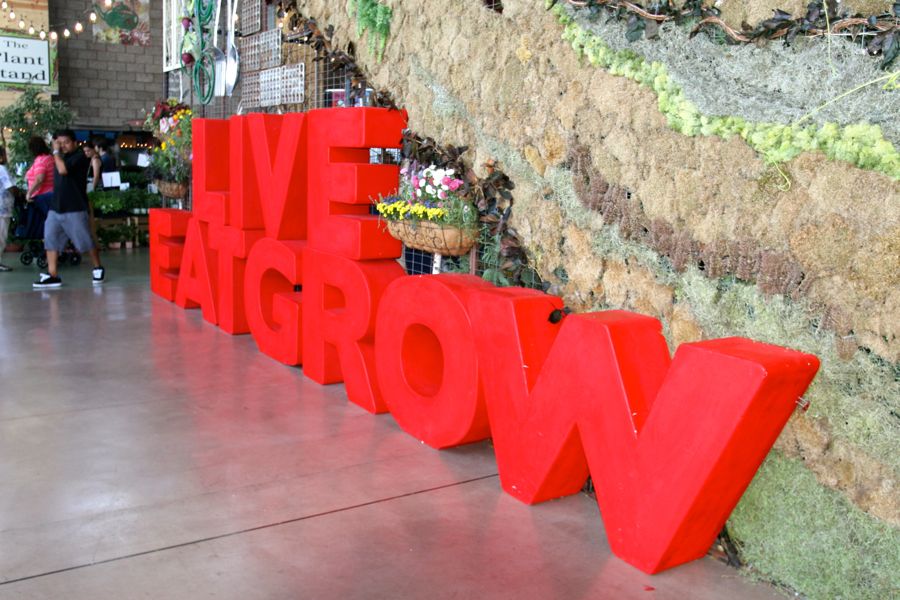Off For A Quick Visit To The Fair 7/23/2011 (PageThree)
We got there at the opening and at 3:00 it was getting crowded so we headed for home! We have been going since 1988 so we didn't take a slew of pictures this trip... Only some of the more interesting shots.

First things first... Cinnamon buns and a cold iced coffee




Yummy
... It passes muster... We are good to go

Even the cow liked the smell of the buns
Time To Ride The Skyway

Up up we go...

Food everywhere


Not too many people this early...

Paul like the kiddy Ferris Wheel... Not too far up

Monster Trucks were great
Did You Know? - A monster truck is a pickup truck, typically styled after pickup trucks' bodies, modified or purposely built with extremely large wheels and suspension. They are used for competition and popular sports entertainment and in some cases they are featured alongside motocross races, mud bogging, tractor pulls and car-eating robots.
A monster truck show sometimes involves the truck crushing smaller vehicles beneath its huge tires. These trucks can run up and over most man-made barriers, so they are equipped with remote shut-off switches, called the Remote Ignition Interruptor (RII), to help prevent an accident if the driver loses control at any time. At some events, only one truck is on the course at a time, while most feature two drivers racing each other on symmetrical tracks, with the losing driver eliminated in single-elimination tournament fashion.
In recent years, many monster truck competitions have ended with a "freestyle" event. Somewhat akin to figure skating with giant trucks, drivers are free to select their own course around the track and its obstacles. Drivers will often try "donuts", wheelstands and jumps during this segment. Additional items for the drivers to crush, usually including a motor home, are frequently placed on the track specifically for the freestyle event. Other obstacles sometimes placed on the track include school buses and small airplanes.

Pirates are not all bad
We Had To Visit The Infirmary

During WWII this as the base infirmary



The Queens had great costumes... Like everything else... The womens movement killed another good thing

Foodies

Fair food... Yum

They will try and fry anything
Flowers & Collections Next





USS Indianapolis memories
Centennial Farms Here We Come


The cute chick pets the little yellow chick


There is a sheep in this pile of hair... See it?

Blueberries
Did You Know? - An antioxidant is a molecule capable of inhibiting the oxidation of other molecules. Oxidation is a chemical reaction that transfers electrons from a substance to an oxidizing agent. Oxidation reactions can produce free radicals. In turn, these radicals can start chain reactions. When the chain reaction occurs in a cell, it can cause damage or death. When the chain reaction occurs in a purified monomer, it produces a polymer resin, such as a plastic, a synthetic fiber, or an oil paint film. Antioxidants terminate these chain reactions by removing free radical intermediates, and inhibit other oxidation reactions. They do this by being oxidized themselves, so antioxidants are often reducing agents such as thiols, ascorbic acid or polyphenols.

Is it Halloween yet???

Magnificent flowers

Ah... Bonsi

We have to try this and see....
Did You Know? - Garlic is grown globally, but China is by far the largest producer of garlic, with approximately 10.5 million tonnes (23 billion pounds) grown annually, accounting for over 77% of world output. India (4.1%) and South Korea (2%) follow, with Egypt and Russia (1.6%) tied in fourth place and the United States (where garlic is grown in every state except for Alaska) in sixth place (1.4%). This leaves 16% of global garlic production in countries that each produce less than 2% of global output. Much of the garlic production in the United States is centered in Gilroy, California, which calls itself the "garlic capital of the world".

Leon and Marcia have a side business

The art gallery had an interesting ceiling lamp

Junk man

A neat cake taken through the glass


Great Chevy Pickup

Remember these... We were green 60 years ago
Did You Know? - Before milk bottles, milkmen filled the customers' jugs. For many collectors, milk bottles carry a nostalgic quality of a bygone age. The most prized milk bottles are embossed or pyroglazed (painted) with names of dairies on them, which were used for home delivery of milk so that the milk bottles could find their way back to the dairy for reuse. The color, picture, dairy, and condition all contribute to the value of the milk bottle.
It is not clear when the first milk bottles came into use. However, the New York Dairy Company is credited with having the first factory that produced milk bottles, and the first patents for a milk container is held by the Lester Milk Jar on January 29, 1878 - US patent number 199837, filed on September 22, 1877

Tun Tavern
Did You Know? - Tun Tavern, in Philadelphia, is regarded as the birthplace of the Corps as the location of the first Marines to enlist under Commandant Samuel Nicholas, though it is disputed if a recruiting drive may have occurred earlier at Nicholas's family tavern, the Conestoga Waggon [sic].[5] When the Revolutionary War ended in 1783, the Continental Navy was disestablished, and with it, the Continental Marines. The Corps was re-established on 11 July 1798, when the "act for establishing and organizing a Marine Corps" was signed by President John Adams.

Sketch of
Tun Tavern
in the Revolutionary War, birthplace of the Continental Marines, from which is descended the USMC

Beverly Carlson (Carri Fox) won two ribbons
Did You Know? - Quilting is a sewing method done to join two or more layers of material together to make a thicker padded material. A quilter is the name given to someone who works at quilting. Quilting can be done by hand, by sewing machine, or by a specialist longarm quilting system.
The word quilt is derived from the Latin culcita, meaning a padded and tied mattress. Quilting originated for its utility, as the technique produced a thicker padded fabric either for warmth or for protection. The first evidence of quilting is found in Asia sometime before the 1st century CE. A quilted linen carpet dating from that time was found in a Siberian cave tomb. The central motifs (primarily animals, with abstract spirals on the borders) are worked in the backstitch, while the background is diamond quilted in a coarse running stitch.
Ancient Egyptian sculptures show figures which appear to be wearing quilted clothing, possibly for warmth in the chilly desert evenings. Quilting has been part of the needlework tradition in Europe from about the 5th century CE. Early objects contain Egyptian cotton, which may indicate that Egyptian and Mediterranean trade provided a conduit for the technique.

A wooden field... amazing

Some people are so clever

Fully flyable model
